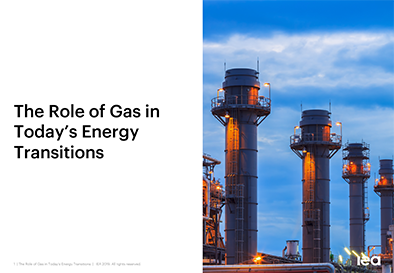The Gas and Energy Transition Research Centre is a centre of research excellence.
The Centre conducts real-world research focussed on optimising Australia’s natural gas industry terms of environmental performance, social performance, and optimisation of cost of operation and supply.
Research vital: natural gas to play a key role in the long transition to a low carbon future
Using natural gas for energy production, when production processes are optimised, produces significantly less greenhouse gas emissions than other fossil fuels.
The peak energy body, the International Energy Agency (IEA), forecasts that to achieve lower global emissions, natural gas production may need to grow to account for a quarter of energy demand by 2040.
Australia’s gas resources create the potential for the country to be a major global supplier of natural gas to help meet the increasing demand for cleaner, affordable energy over the transition decades to a low emissions future.
Global issue: Access to cheap, clean energy and power
Access to cheap, clean energy and power is one of the biggest issues facing the world right now.
The number of people without access to electricity fell to below 1 billion (2018) for the first time in decades; at the same time, CO2 emissions were the highest on record.
There is a huge amount of work going on across the globe into developing more sustainable options for powering our future.
Underpins global food production & many other industrial uses
Less well known is the importance of natural gas in food production globally.
It is often forgotten that it is also the principle constituent in over 80% of the world’s nitrogen fertilisers – and as such a significant factor in global production capacity. The need to sustainably grow food production is increasing as the global population heads to over 9 billion before 2050.
The new energy mix is unknown: research needed
Lowering emissions is a complex long-term global issue. There is no single solution to turn emissions around. It will be a mix of energies, and research will play a key role in shaping what the mix ultimately looks like.
Renewables, increased efficiency and a host of innovative technologies across a range of industries are needed.
As one of the largest challenges facing the world today, it will require a concerted research effort over the coming decades to optimise a mix of solutions which comprise of action on many fronts.
The task ahead is best considered as an “AND” challenge. Reducing carbon intensity and carbon emissions across the globe requires renewables AND efficiency improvements AND carbon capture and storage AND nuclear AND….
Achieving the targets will take many years of concerted action from researchers, government, industry and the community.
Recognising gas is just one plank in the broader global solution, the Gas and Energy Transition Research Centre remains closely connected across the broad range of research disciplines in the overall energy context.
Gas: a key pathway to transition to a low carbon energy future
Natural gas typically burns more efficiently than coal or oil produces significantly less greenhouse gas emissions than other fossil fuels and therefore can have a key a role in supporting the journey towards lower or zero emission renewable energy sources.
The International Energy Agency has highlighted natural gas as having a greater share in the future global energy mix, as the relative share of oil and coal falls back and renewables ramp up strongly.
In its “new policy” scenario which is aimed at meeting Paris COP21 commitments, the International Energy Agency suggests that natural gas would need to replace coal as the world’s second most important energy source by the mid-2030s as countries seek to cut air pollution. This hinges on any new gas fields, technology and processes developed delivering a low emission signature relative to coal and suggests a specific focus on reducing fugitive emissions.
To move beyond current committments still requires a growth in gas supply.
Australia has extensive natural gas resources and has focussed considerable research investment into developing cutting-edge technologies to optimise the sustainable production of natural gas.
New technologies are required to produce gas from large reserves that are currently too difficult or too expensive to access. This kind of advance is key to managing affordability and security of supply, developing Australia as a supplier of choice both domestically and internationally.
Community, local economy, jobs and growth
Developing Australia’s natural gas potential can support future economic development, open the door to new investment and grow employment in regional Australia. This translates as jobs and a more secure future for Australia.
A unique toolkit has been developed by the Gas and Energy Transition Research Centre which assesses how gas impacts regional development and shapes rural communities. The toolkit monitors changes in the Queensland gasfield regions, assessing trends using interviews and statistical data on key indicators. These indicators include population, housing costs, incomes, unemployment, and crime rates. This information has helped to identify cause and effect, providing an understanding of each town studied and an understanding of the region as a system. These understandings are essential to making decisions aimed at improving outcomes for each community and the region's future.
“Golden rules” of gas
The UQ Gas and Energy Transition Research Centre is monitoring and contributing to improving Australia’s position across each of the International Energy Agency’s “golden rules” of gas. Some of the headline principles include:
1 Measure, disclose and engage
2 Watch where you drill
3 Isolate well and prevent leaks
4 Treat water responsibly
5 Eliminate venting, minimise flaring & other emissions
6 Be ready to think big
7 Ensure a consistently high level of environmental performance
The Centre has reviewed these rules and their application in Queensland. We’ve categorised the rules under four key areas of real world impact (reduce cost, increase supply, environmental performance and socio-economic & transparency). All research on our website now clearly shows which of the golden rules each projects addresses, and defines the real-world impact we are seeking to achieve
Bringing science & fact to decision making
The Gas and Energy Transition Research Centre is the first port of call for independent advice on natural gas development onshore Australia. The work of the Centre enables it to bring science and facts to decision making.
There are many technical and social challenges to effecting a sustainable transition. The Centre assists government, community and industry in these challenges, particularly those applying to the onshore gas sector.
UQ’s commitment to a sustainable energy future
The University of Queensland (UQ) is strongly committed to contributing to a sustainable energy future. It is active in research across the broad range of practical strategies being developed to contribute to the global solution.
Partnership & collaboration
The Gas and Energy Transition Research Centre uses a novel university-industry collaboration and partnership model. At the core of the model is key support from The University of Queensland and industry players, Arrow Energy, Santos and APLNG. Government support is also key in the Centre. A number of grants have been awarded under the Australian Government's Australian Research Council continuous ARC Linkage Projects scheme, the Advance Queensland Innovation Partnership and the Industry Research Fellowship programs, and the NERA (National Energy Resources Australia) project fund.
The Centre’s lead researchers are actively engaged in discussions with other companies, governments and researchers – both nationally and internationally – to access leading expertise and share knowledge generated through the Centre’s research. Useful resources
Related publications
- WEO Analysis: Natural gas is in good shape for the future
- WEO: Outlook for Natural Gas (exerpt)
- IEA: The Role of Gas in Today's Energy Transitions.
- IEA: Energy transitions towards cleaner more flexible and transparent systems
- Click on the map for a live update on carbon intensity by electricity consumer
New working papers
Australian natural gas research: Supporting the transition to low emission energy and affordable energy supply
 "Natural gas has a valued and important part to play in the energy mix and the future of this country. We are leading world-class research to bring science and fact to decision making around Australia’s important resource and energy source of the future."
"Natural gas has a valued and important part to play in the energy mix and the future of this country. We are leading world-class research to bring science and fact to decision making around Australia’s important resource and energy source of the future."
- Andrew Garnett, Emeritus Professor, former Director, The University of Queensland Gas and Energy Transition Research Centre
- Million toe
Link to free downloadable copy of the International Energy Agency publication: The Role of Gas in Today's Energy Transitions.

